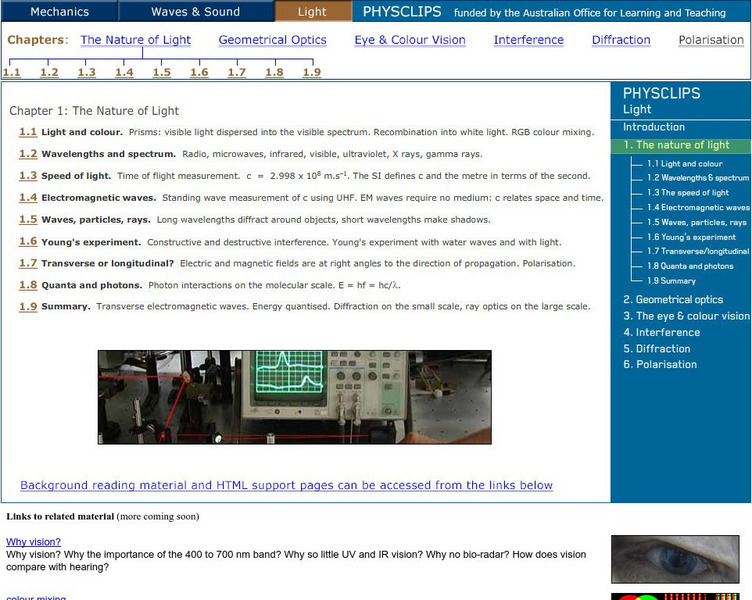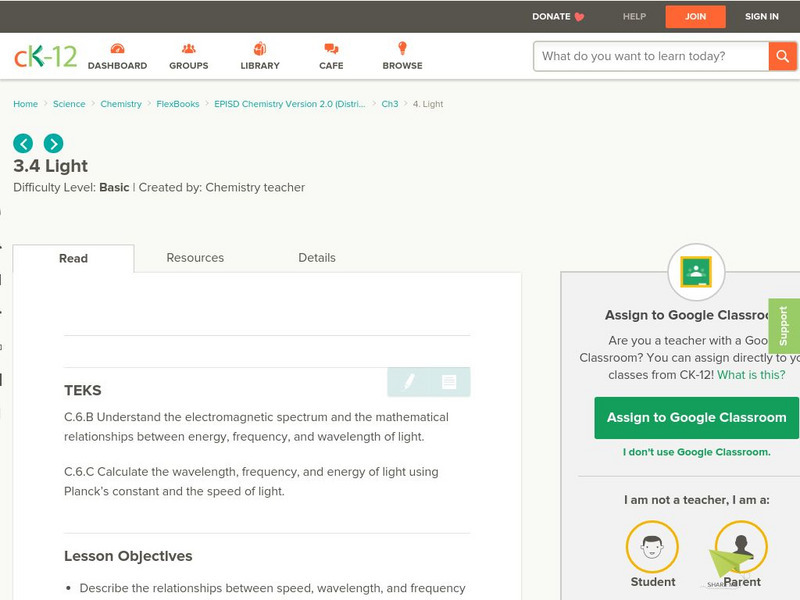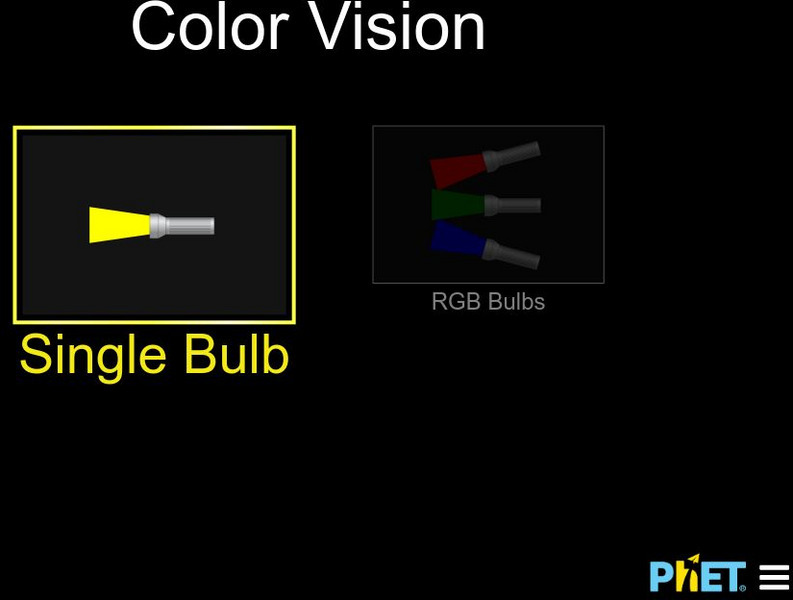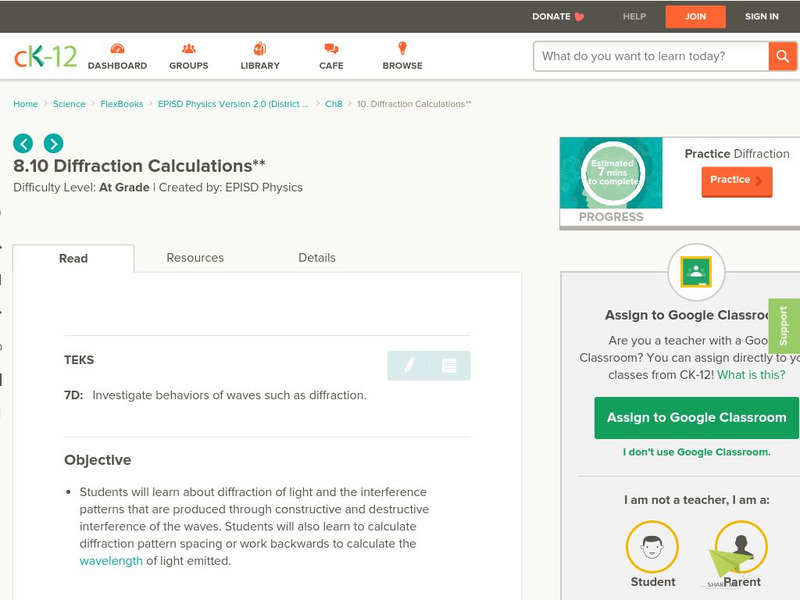Curated OER
Mixing Colors
Students understand why we see various colors. In this mixing colors instructional activity, students experiment with different food coloring to explore how colors are made. Students record on a data sheet the colors they see.
Curated OER
Modern Physics, The Quantum
In this physics worksheet, students examine the relationship between the discrete and continuous spectrum alongside other concepts for the 9 questions.
Curated OER
Supernova Chemistry
Using spectroscopes, high school astronomy, physics, or chemistry learners observe emission spectra from several different sources. This stellar NASA-produced lesson plan provides terrific teacher's notes and a student handout. Make sure...
Discovery Education
Sonar & Echolocation
A well-designed, comprehensive, and attractive slide show supports direct instruction on how sonar and echolocation work. Contained within the slides are links to interactive websites and instructions for using apps on a mobile device to...
Curated OER
Physics and the Quantum Mechanical Model
In this physics activity, students review vocabulary terms and key equations associated with the quantum mechanical model. Students apply the quantum theory to explain the photoelectric effect. This activity has 5 true or false, 12...
Curated OER
The Most Important Equation in Astronomy!
For this astronomy optics worksheet, students calculate the angular resolution and maximum resolution for given telescope specifics. This worksheet has 3 problems to solve.
Curated OER
Understanding Symbols
In this symbols worksheet, students read about how different symbols are used to represent variables or constants in equations. Then students complete 3 problems.
Curated OER
Which Colored Filter Will Decode a Secret Message?
Students investigate how to create secrete messages through filters. They view pictures with red and green filters and discuss what they observe. They select the color filter that works best to read secret messages. They view pictures...
Curated OER
Chandra X-Ray Observatory
Students tour Chandra's top galactic X-ray images. For this Chandra X-Ray Observatory lesson, students play games and complete puzzles based on the Chandra Mission and X-Ray Astronomy. Students listen to pod casts, question an...
Curated OER
Atomic Theory
For this atomic theory worksheet, students use Planck's constant, Rydberg constant, and Avogadro's number to complete 20 multiple choice questions.
Curated OER
Spectral Surprise
Students experience a model that produces, separating, and displaying spectral colors.
Curated OER
The Colors on My TV Screen
Students explore how electronic screens use only three colors to produce the colors that people see on the screen. They make and test a color wheel.
University of New South Wales (Australia)
University of New South Wales: School of Physics: Physclips:the Nature of Light
Physiclips thoroughly presents mechanics concepts about light with animations and film clips. Learn about light and color, wavelengths, speed of light, electromagnetic waves, Young's experiment, and photons.
Science Education Resource Center at Carleton College
Serc: How Can We Measure the Wavelength of Light Emitted From Stars?
This activity is designed for students to apply their knowledge of mathematics and physics to "real life" situations. Students are presented with the situation that they are on a camping trip and wish to know the wavelength emitted by a...
Florida State University
Florida State University: Molecular Expressions Microscopy Primer: Light and Color Refraction of Light
Comprehensive and sophisticated overview of light refraction includes an historical overview of the subject and explanations of the mathematics that underpin refractive indexes, the relative index of refraction, Snell's law, and light...
Science Struck
Science Struck: Wavelength of Light
Describes the characteristics of light, presents two formulas for calculating its wavelength, and provides a table of the different wavelength ranges across the electromagnetic spectrum.
CK-12 Foundation
Ck 12: Light
[Free Registration/Login may be required to access all resource tools.] In the following tutorial students will describe the relationships between speed, wavelength, and frequency of light. They will understand the photoelectric effect...
TeachEngineering
Teach Engineering: Sound and Light
The Sound and Light unit provides students with an understanding of sound and light waves through the theme of the "Sunken Treasure," a continuous story line throughout the lessons. In Lessons 1-5, students learn about sound, and in...
University of Colorado
University of Colorado: Ph Et Interactive Simulations: Color Vision
Make a whole rainbow by mixing red, green, and blue light. Change the wavelength of a monochromatic beam or filter white light. View the light as a solid beam, or see the individual photons.
University Corporation for Atmospheric Research
Ucar: Blue Skies and Red Sunsets
Find out how some wavelengths of light are scattered more than others producing blue skies and red sunsets.
PBS
Pbs Learning Media: Jewel Box Sun
See the sun like you have never seen it before! Using a specialized telescope, NASA developed images of the sun created from a wide range of wavelengths of light. Each wavelength is represented by a different color making a beautiful...
Florida State University
Florida State University: Molecular Expressions: Refraction of Light
Manipulate the incident angle, color of light, wavelength, and medium to see how the refracted angle is affected.
CK-12 Foundation
Ck 12: Diffraction Calculations
[Free Registration/Login may be required to access all resource tools.] Students investigate diffraction of light and the interference patterns that are produced through constructive and destructive interference of the waves. Students...
Physics Classroom
The Physics Classroom: Refraction and the Ray Model of Light: Rainbow Formation
Understand the physics behind Roy G. Biv, and how rainbows are formed by drawing upon our understanding of refraction, internal reflection, and dispersion.




















